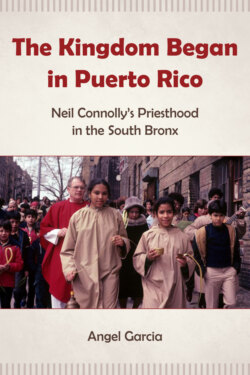Читать книгу The Kingdom Began in Puerto Rico - Angel Garcia - Страница 7
На сайте Литреса книга снята с продажи.
ОглавлениеFOREWORD
George Horton, Director of Social and Community Development, Archdiocese of New York
Angel Garcia has given us a wonderful gift in authoring The Kingdom Began in Puerto Rico: Neil Connolly’s Priesthood in the South Bronx.
Angel has memorialized for us the formative ministry years of Father Neil Connolly, who, along with his compatriot Bronx parish priests, religious sisters, and lay ministers, lived out his ministry in the turbulent South Bronx of the 1960s, 1970s, and 1980s. He has traced Father Neil’s developing understanding of his own priesthood as he became immersed in the life of the Puerto Rican community and came to know and be known by the people living there. Angel ably blends the dynamic forces of Church and world that transformed Connolly as he grew into realizing the meaning of his vocation.
Father Neil and his brother priests brought their deep faith, which they had learned in their families and in the seminary, to an encounter with the people of the Great Puerto Rican Migration to whom they opened their hearts and minds. Both anticipating and riding the crest of the wave of Vatican II, they, together with their colleague nuns and laity, heard the radical summons of the opening words of Gaudium et Spes, the Pastoral Constitution on the Church in the Modern World:
The joys and hopes, the griefs and the anxieties
of the men of this age, especially those who are poor
or in any way afflicted, these are the joys and hopes,
the griefs and anxieties of the followers of Christ. Indeed nothing genuinely human fails to raise an echo in their hearts.
Father Neil understood the centrality of not only bringing God’s Word and the sacraments of the Church into people’s lives, but also standing in solidarity with them as they struggled to overcome the debilitating economic, social, and political challenges of poverty and exclusion encountered in their daily lives. He worked with the people to organize communities of love and hope, and to empower them for discipleship, social change, and building God’s Kingdom—endeavors often at odds with the institutions of both the government and the Church. Father Neil understood the value of the laity and the critical importance of developing lay leadership for the well-being of the community and for the life of the Church.
Although many of these events took place fifty years ago, in many ways the story recounted here can provide an orientation toward a rejuvenation and enlivening of the Church and ministry for priests and for parish communities. So much of what is told here echoes the call of Pope Francis to go to the peripheries and walk in accompaniment with people living on the margins—in Father Neil’s case, burgeoning communities of newly arrived Puerto Rican people who were living in poverty and amidst the destruction of the South Bronx. The 2019 Synod on the Amazon underscored the need to listen to the people, learn from their experience, and create forums of communication across social, economic, and political divides. Father Neil, always intellectually curious, imbibed the language and culture studies in Puerto Rico with Ivan Illich and then applied what he learned to cross boundaries; encounter the people; listen, walk, and dialogue with them; and, yes, learn about God from them.
I came to know Father Neil over the last twenty years of his life, after he had left the South Bronx to be Pastor of St. Mary’s Parish on Manhattan’s Lower East Side. What I remember most is how engaged he always was in the world around him. He would recount stories with such verve and vividness that it was as if each moment, place, and person remembered were still immediately present to him in a kind of loving embrace. Our conversations usually revolved around his planning of some event for parishioners and priests to deepen their knowledge of Catholic social teaching and to organize for social action, or his attempt to assist some person whom he was concerned about and who was in need of immediate help. Neil’s priesthood always operated on both personal and social levels.
I last saw Father Neil when I visited him some two weeks before he died at the retirement home for priests where he had gone when he was faced with his last illness. I attended Mass with him, and afterward we sat together in silent prayer. After a delightful lunch with other resident priests, we retreated to his room where we talked for about three hours. Although he was physically frail, his enthusiasm and intellectual curiosity continued undiminished as he recounted his efforts to organize the resident priests into reading and reflection groups. We sat surrounded by his beloved books. He was slowly making his way through the Bible and he shared with me, as he usually did, his latest spiritual reading.
As always, the Church must be about its mission of spreading and living the Gospel, the work of evangelization. Being in Father Neil’s presence, one always felt the pull of conversion through his embodiment of what Pope Francis refers to in his encyclical the Joy of the Gospel. We owe a great debt of gratitude to Angel Garcia, who has captured so well the openness of Father Neil to the urgings of the Spirit and his willingness to respond in joy to the signs of the times. Father Neil loved being a priest, and he both fulfilled and challenged its ideal. He was joyfully engaged in the Lord’s work up to the day he died.
